Edie Melson's Blog, page 49
June 12, 2024
Nibble—Or Gobble—Your Way Through a Writing Conference
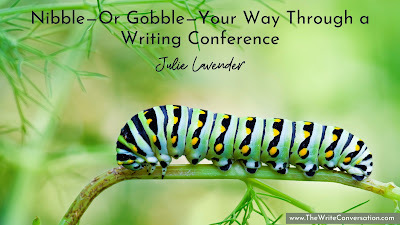
by Julie Lavender @JLavenderWrites
My husband’s delight for his babies shows each time he talks about them. And that’s every morning these days, after he walks outside and checks on them first thing after waking.
David carefully planted and tended pots of fennel, celery, dill, and curled parsley in the back yard. He also made sure to station pots of milkweed nearby. You see, my now-retired, former entomologist hubby plotted and planned just the right methods to attract black swallowtail butterflies to our yard to lay eggs after feeding on yummy milkweed nectar.
His plan worked. He counted two eggs one day, then three more the next day, and a few more after that. Soon, tiny caterpillars emerged. And oh, my goodness—those very hungry caterpillars appeared to triple in size daily!
I couldn’t help but be reminded of one of my favorite books to read to my own kids and my classroom full of students—The Very Hungry Caterpillar. With conference season upon us, I began to envision writers as hungry little caterpillars, feasting on the wisdom and experience of authors just a little farther down the path.
That very hungry caterpillar started with one apple, delicately nibbling his way through. Is that you at a conference? Cautious and careful … meeting only one new friend at a time, taking in the information at one session or one keynote?
But the caterpillar was still hungry, so it ate his way through two pears, just like the writer at a conference attends another session, meets a new friend, or reconnects with an old one.
Still hungry, the caterpillar consumes three plums. The conference-attending writer nourishes his or her soul with keynotes and worship time and one-on-one sessions.
Four strawberries and five oranges later, the caterpillar and the writer devour every crumb and soak up every bit of nutritional value offered.
Next comes the goodies—cake, ice cream, pickle, slice of Swiss cheese, salami, lollipop, cherry pie, sausage, cupcake, and watermelon slice. Silly, right? Nothing of nutritional value there for a caterpillar, but maybe these are the parts of a conference that are just-for-fun extras that may or may not lead you further down the publication path. But what fun you’ll have in the process!
And with one green leaf remaining near the end of the book, the caterpillar is no longer “little.” Just like the conference attendee—stuffed to the brim with sustenance, tidbits, and extra goodies. As the caterpillar wraps itself in a cocoon—or as my entomologist hubby would correct, “chrysalis,” the writer wraps himself or herself in a cozy blanket of satisfaction from yet another successful conference.
Though it may take time, with the information and wisdom the writer gleaned and absorbed at the conference, he or she changes and grows, maybe a little, maybe a lot. The conference attendee transforms into a beautiful butterfly, ready to fly and soar and take on the writing world like a champion.
It’s a beautiful journey.
Nibble—or gobble—your way through a writing conference. And be ready for the transformation!
Tell us about a recent conference experience, the nibbles and gulps. What was your favorite part? What life-changing bit of information did you learn while there?
TWEETABLENibble—Or Gobble—Your Way Through a Writing Conference from @JLavenderWrites on @EdieMelson (Click to Tweet)
 Julie Lavender’s favorite part about attending writing conferences is the people she meets there. Many of those writers, faculty members, and staff have become dear friends over the years. She attributes conference-attending to the blessings of several recent books, including Children’s Bible Stories for Bedtime, Strength for All Seasons: A Mom’s Devotional of Powerful Verses and Prayers, and 365 Ways to Love Your Child: Turning Little Moments into Lasting Memories. She’s especially excited about her first picture book coming out in the fall. A Gingerbread House, published by End Game Press, releases in October.
Julie Lavender’s favorite part about attending writing conferences is the people she meets there. Many of those writers, faculty members, and staff have become dear friends over the years. She attributes conference-attending to the blessings of several recent books, including Children’s Bible Stories for Bedtime, Strength for All Seasons: A Mom’s Devotional of Powerful Verses and Prayers, and 365 Ways to Love Your Child: Turning Little Moments into Lasting Memories. She’s especially excited about her first picture book coming out in the fall. A Gingerbread House, published by End Game Press, releases in October.
Published on June 12, 2024 22:00
June 11, 2024
Query Letter Questions Answered

by Linda Gilden @LindaGilden
Recently I was teaching about articles at a writer’s conference. Just before we ended someone asked, “I’ve heard about query letters. Can you tell me quickly what that is and when to use a query letter?”
Well, one thing I can’t stand is to think that anyone would leave my class with unanswered questions. My remark was, “Sure, but listen fast so you can get to your next class!” I quickly made a list of questions in my head so I wouldn’t forget anything they needed to know about query letters.
What is a query letter?
A query letter is just what it says—a query or question in the form of a letter. The question you are asking is “May I send you my article on speculation.”
Do I need a query letter for everything I submit to a publisher?
Unless you have met an editor or publisher and he or she has requested your material, you need to write a query letter. If you have met them at a conference, you may use a cover letter. A cover letter reminds the editor he requested to see your work.
To whom should I address my query letter?
The query letter should be addressed to the editor who would accept your work.
Is it okay to say “Dear Editor?”
Always address your query letter to the editor by name. If you don’t know who that is, find out before you write. You can check the website, magazine masthead, or current market guide. You can also call the publishing house and ask who the proper editor for your manuscript is. If the name is Pat Smith and you do not know if Pat is Mr. Smith or Ms. Smith, begin the letter with “Dear Pat Smith.”
When can I follow up on my query letter?
Editors are very busy, and you want to give them time to read your query. Allow at least the amount of time stated in the guidelines before following up with a brief politely inquiring email.
What about email queries?
Email queries are becoming more and more the norm. However, everyone doesn’t use them. Check the market guide or the publishing house to find out.
Should the article be complete when I write a query letter?
Not necessarily. However, you must have done enough research for your article to know where you are going with it. Just be sure it will fall within the acceptable number of words according to the guidelines of the magazine.
Isn’t it risky to send a query letter before finishing my work?
Querying gives the editor the opportunity to give feedback on your idea. He or she may love the idea but need a slightly different approach to the subject. So, querying first actually saves you time. You know what the editor wants before you start writing. Just be realistic about the time you promise to deliver the first article.
How long should my query letter be?
Your query letter must be kept to one page.
What is the best format for query letters?
Query letter should be three or four paragraphs, single-spaced, with a space between paragraphs. Use standard, nice weight, 8 ½ x 11 paper. Write on your letterhead in business format. If you don’t have letterhead stationery, you can create one on your computer. Canva.com has some great examples of letterheads and can help you create yours.
The first paragraph should be the hook. It should make the editor want to read more. You could possibly use the first paragraph of your article. Statistics, questions, and anecdotes are excellent ways to begin.
Remember your query letter is the editor’s introduction to you and the quality of your writing.
The second paragraph should be why this article is needed and why you are the best person to write it, and any related qualifications you want to include.
The third paragraph should tell the nuts and bolts of your article. This includes how many words, when it could be completed (six weeks is a reasonable time), and how soon you could get it to the editor.
Be sure to thank the editor for his or her time and the opportunity to submit your work to their publication. If you are submitting by mail, include a self-addressed, stamped envelope.
A good query is your letter of introduction to an editor. It must show you are a professional and you write with excellence. A good first impression will open doors and create opportunities. Make sure your query is a “door opener” and not a “door closer.”
Moira Allen reminds us, “The ability to write a good query is one of the most important skills in the writer’s toolbox.” Do you agree with Moira? I certainly do!
TWEETABLEQuery Letter Questions Answered from author @LindaGilden on @EdieMelson (Click to Tweet)
 Linda Gilden is an experienced, bestselling writer, speaker, award-winning editor, marketer, and speaking coach, ghostwriter, and writing coach. Author of 40 books and 2,000+ magazine articles, Linda appreciates a great story. She believes with our stories, we can change the world one word at a time and loves to encourage others to do that through writing coaching and personal tutoring. Her newest book was released in November: TRADING SHADOWS: EXCHANGING A LIFE OF SECRETS, FEAR, AND DOUBT FOR A LIFE OF FREEDOM WITH THE ALMIGHTY.
Linda Gilden is an experienced, bestselling writer, speaker, award-winning editor, marketer, and speaking coach, ghostwriter, and writing coach. Author of 40 books and 2,000+ magazine articles, Linda appreciates a great story. She believes with our stories, we can change the world one word at a time and loves to encourage others to do that through writing coaching and personal tutoring. Her newest book was released in November: TRADING SHADOWS: EXCHANGING A LIFE OF SECRETS, FEAR, AND DOUBT FOR A LIFE OF FREEDOM WITH THE ALMIGHTY.
Published on June 11, 2024 22:00
June 10, 2024
Life Lesson From a Writer’s Journey
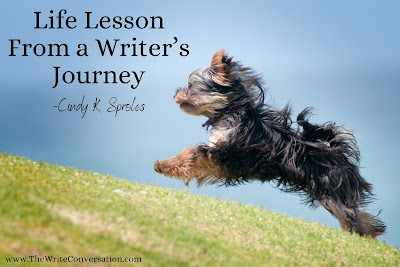
by Cindy K. Sproles @CindyDevoted
This post won’t be the usual “writing” blog post for several reasons. 1) There’s a life lesson here. 2) It’s about me.
This isn’t your standard learning post, but then it is. Finding a beginning without sounding trite or selfish is difficult—bear with me.
I began my writing journey some twenty-four years ago, and it has been and still is an uphill battle— one I am not alone on. Any writer who chooses writing as a career is in for a steep climb. But what I hope you can learn from this post is that persistence and determination pay off.
When I began my career, I worked 40-50 hours weekly as a vet surgery tech. I had four boys and a husband at home and what some would consider a small farm of pets. Time was of the essence. It wasn’t easy to get in writing time, but I decided that, amid all my giving to others, this was my giving to me, so I rolled out of bed every morning at 5:00 a.m. That one hour a day was quiet and uninterrupted. I could write, and I did.
I attended the Blue Ridge Mountains Christian Writers Conference, which introduced me to a career. Learning the basics while struggling to find some form of affirmation that I even had an inkling of ability that would warrant continuing didn’t come quickly. It took time. I wrote, learned, and received my share of rejections—but I kept at it.
There was even a point where my writing peers told a friend they weren’t inviting me into their critique group because “she isn’t ready.” That stung. I thought friendship was deeper than “being ready.” And how could I “get ready” without feedback to help? So, I knuckled down and put in the work.
I had articles published along the way and won a few conference contests, which gave me a little confidence, but like anything, there are three times the number of losses for every win. Though disappointing, I had to remember the prayer I continually prayed. “Lord, the work and the glory will be yours. Let me be a writer.” Now, my ministry partner fussed at me for that prayer. “You’re not trusting the gifts given to you by the Father. He has gifted you this ability.” And though I couldn’t argue that fact, I wanted to show God that the gift He’d given me was not taken for granted and that any success would be His through me. Let me be a writer. And—He did.
God answered my prayers and gifted me my first novel through Kregel Publications seven years after I began writing—the first year of the Selah Awards. The book was a hit out of the gate. Sales were great and it earned out its advance in the first month. My agent, friends, and publisher encouraged me to enter it into the Selahs. So I did. I was thrilled when it finaled and took a kick to the gut when it did not win.
Life Lesson One: My prayer came back to mind. The success and glory will be yours. Let me be a writer. God answered that prayer to the tee.
The writing hill grew steeper as I moved ahead. Could I turn out another book as successful as the first? Could God use it, or more so, would He use it? Then bam. Two brain surgeries hit right in the middle of the publisher’s edits. For months, I could barely keep my thoughts straight. My short-term memory waned, and I lost my equilibrium and 60% of my hearing. Still, we finished the book, and it did well. I entered contests and won some, but I only finaled in the Selahs once again.
Things were looking up in my career, but contracts were challenging to secure, not because of my skill but because of the numbers game. Though sales were very good, publishers wanted MORE. Still, I kept at it through rejections and frustrations.
Life Lesson Two: Just because you succeed once doesn’t mean the road will be easy. People demand more of you. Are you willing to bear the stripes of rejection?
All this is to sum up one major point. If being a writer is what you want, will you bear the stripes of rejection because they will come? And come again.
Have I stuck in the knife and twisted, told you the bitter news that writing is hard and that success is slim? It’s essential to realize that success as a writer isn’t just handed to you. It’s earned. It doesn’t come fast or without failure. Writing is not all glam and accolades. It’s an industry and a career, and the spots are limited to fill, but are you willing to put in the work?
This year, after the birth of five novels, I reached the summit—the accolade I’d worked for happened. The name that has followed me since high school, Consistently Second Cindy, crumbled at the feet of those who held it over my head for 48 years.
Life Lesson Three: “My timing is perfect. Love, Your Heavenly “Father.
If you gain nothing from this post other than publishing is hard, I have failed to convey the point. If you want to be a writer, the accolades are not what you reach for, but you reach for learning the craft. You stretch for the determination and wherewithal to strive to be better. You don’t quit because you final, and you definitely don’t stop after the win. The work is just beginning because people expect more. God doesn’t expect more. He expects your best. That is what this post is about. The words to an old hymn: Trust and obey, for there’s no other way… These words are what your life and your road in this publishing industry should reflect. That should be all the wins you need.
Stick to it. Work hard. Learn. Give to others through your experience. Teach. Share. Pray. And finally, wait. Your time will come, and it will be sweet like honeysuckle.
TWEETABLELife Lesson From a Writer's Journey - @CindyDevoted on @EdieMelson (Click to Tweet)
 Cindy K. Sproles is an author, speaker, and conference teacher. Having served for a number of years as a managing editor for Lighthouse Publishing of the Carolinas and Ironstream Media, Cindy now works as a mentor, coach, and freelance editor. She is the co-founder of Writing Right Author Mentoring Services with Lori Marett and she is the director of the Asheville Christian Writers Conference. Cindy is also the co-founder of Christian Devotions Ministries and WWW.CHRISTIANDEVOTIONS.US, as well as WWW.INSPIREAFIRE.COM. Her devotions are in newspapers and magazines nationwide, and her novels have become award-winning best-selling works. She is a popular speaker at conferences and a natural encourager. Cindy is a mountain girl, born and raised in the Appalachian mountains, where she and her husband still reside. She has raised four sons and now resorts to raising chickens where the pecking order is easier to manage. You can visit Cindy at WWW.CINDYSPROLES.COM or www.wramsforwriters.com.
Cindy K. Sproles is an author, speaker, and conference teacher. Having served for a number of years as a managing editor for Lighthouse Publishing of the Carolinas and Ironstream Media, Cindy now works as a mentor, coach, and freelance editor. She is the co-founder of Writing Right Author Mentoring Services with Lori Marett and she is the director of the Asheville Christian Writers Conference. Cindy is also the co-founder of Christian Devotions Ministries and WWW.CHRISTIANDEVOTIONS.US, as well as WWW.INSPIREAFIRE.COM. Her devotions are in newspapers and magazines nationwide, and her novels have become award-winning best-selling works. She is a popular speaker at conferences and a natural encourager. Cindy is a mountain girl, born and raised in the Appalachian mountains, where she and her husband still reside. She has raised four sons and now resorts to raising chickens where the pecking order is easier to manage. You can visit Cindy at WWW.CINDYSPROLES.COM or www.wramsforwriters.com.
Published on June 10, 2024 22:00
June 9, 2024
Thoughts on Focus for Writers & the Distractions We Battle
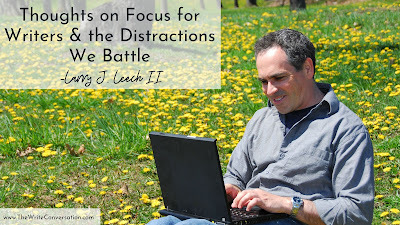
by Larry J. Leech II @LarryJLeechII
With all the distractions that we … did you see that? A squirrel chased a Blue Jay off the bird feeder. I can’t believe it. I didn’t think Jays feared anything.
Sorry about that. Just when I started to write about distractions and the inability to focus, oh geeze, the Jay has gone after the squirrel. I’ve never seen a squirrel run so fast.
Oh yeah, focus. My plan was to write about focus.
Focus.
I can do this.
Focus. For as long as my mind can stay on topic. For the moment, that’s writing this blog.
Limiting distractions as a freelancer is something I had to learn when I left the corporate world more than 20 years ago. I struggled at first. I answered every email as soon as it arrived. I found myself checking out the internet every 15-20 minutes. I answered calls and texts whenever my phone rang or beeped. And I didn’t get much work done.
Until I changed my actions.
Today, I minimize my email, close my browsers, flip my phone face down. I do all this to stay focused on the task at hand.
But I’m not immune to distractions, especially during times I work at my preferred coffee shop. Dozens of people stop in every hour, and I love to people-watch. So, I put my head down and force myself to stay focused on my laptop. And get work done.
These changes have worked for me, and here are a few more ‘focus’ techniques to consider:
Set a timer to work 55 minutes each hour and then take a five-minute break.
Set a timer to pray twice a day during your break.
Hang a Do NOT DISTURB sign on the door of your home office. Or close the door.
Establish a reasonable ‘to do’ list each day AND break each into a smaller task with a deadline.
You may have a few other suggestions. Feel free to share in the comment section … now look, a butterfly. So pretty. Now’s there’s two. Ah, they just fluttered away.
Wait, where was I? Yeah, that focus issue. When achieved, productivity increases. Goals and deadlines are met. Peace replaces anxiety.
And you’ll have plenty of time to watch butterflies.
TWEETABLEThoughts on Focus for Writers & the Distractions We Battle from @LarryJLeechII on @EdieMelson (Click to Tweet)
 Editor-in-Chief at Bold Vision Books and writing coach of award-winning authors, Larry J. Leech II has spent more than forty years writing and editing. He started his career as a sportswriter in southwestern Pennsylvania where he covered prep, college, and pro sports, including the Pittsburgh Pirates and Steelers.
Editor-in-Chief at Bold Vision Books and writing coach of award-winning authors, Larry J. Leech II has spent more than forty years writing and editing. He started his career as a sportswriter in southwestern Pennsylvania where he covered prep, college, and pro sports, including the Pittsburgh Pirates and Steelers. In 2004, after 2,300 published articles, Larry moved into the book publishing industry. Since that time, he has ghostwritten 30 books, edited more than 400 manuscripts, and coached hundreds of authors through the writing and publication process. You can find him online on Twitter, Facebook, and Instagram.
Published on June 09, 2024 22:00
June 8, 2024
Litter-free Writing
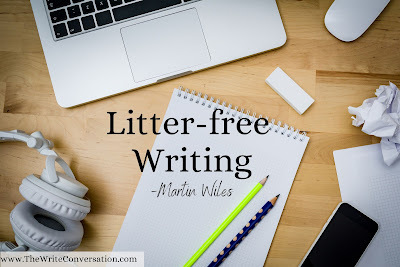
by Martin Wiles @LinesFromGod
When my wife and I relocated to a new subdivision—and I began taking a daily walk to the entrance and back—I immediately noticed the litter. I have hated litter since I was a young boy and first understood what litter was. I’ve been guilty of littering a few times, but my conscience always bothered me. So, I made a pact with God not to litter.
After weeks of seeing litter spoil my view of the woods and the creek that ran through our subdivision, I told my wife, “I’m going to take a bag with me and start cleaning up the litter.” Soon, I could see a difference.
But some litter proved more stubborn. It was caught in briar patches and down hills in wooded areas. Since I was recovering from a broken femur, I didn’t dare be too risky.
One day, we kept two of our grandchildren for a few hours. One of them loves the outdoors and loves to walk with me. After we had made one circle, I asked, “Would you like to help Pop pick up litter?” He jumped at the chance.
We went to work, with him snuggling into those hard-to-reach areas I couldn’t. Soon, we had collected a large garbage bag of cans and bottles. He wanted to know why we were doing this, and I explained how we were obeying God’s command to keep His earth clean.
When God placed Adam and Eve in the newly created garden, he told them to tend it. “The Lord God placed the man in the Garden of Eden to tend and watch over it” (Genesis 2:15 NLT).
We pay the price in numerous ways when we don’t help keep God’s creation clean. After creating the first earth, God looked at what He had made and said, “It is good.”
I also think God looks at what we Christian writers write and declares it good or in need of improvement. And since He gives us the wisdom and tools to make it the best we can, we should. Granted, editing—along with marketing—is the part of the writing process that many writers detest, procrastinate about, and fret over. But in these days of modern publishing, not doing it dooms our devotion, article, short story, or manuscript to a devil’s pit.
Rarely do I send a devotion back to a writer for them to edit for grammar issues, but when I open a document and it lights up like a Christmas tree, I return it. Editors, agents, and publishers expect a clean manuscript. And we don’t have an excuse not to deliver.
Like litter, typos, poor sentence structure, multiple verbitis (Denise Loock’s word), punctuation and capitalization errors, second-person POV, and repetitive words can dirty up our writing. Paying a professional editor to clean it up is wise, but not always necessary. Even if we do, we should clean it before we give it to them.
Other than using what I know from being an English teacher for the past eleven years, my two go-to sources are The Chicago Manual of Style (the writer’s Bible) and the paid version of Grammarly. Of course, the CMOS is a large book. Asking the editing question to Google, followed by the words Chicago style, usually delivers the answer. But better yet is Kathy Ide’s Proofreading Secrets of Best-Selling Authors. She answers the questions and references where they are in the CMOS.
We writers can’t create something perfect as God did with the earth. Everything we produce contains litter of some sort. But I’m glad we live in this age of technological marvels that help us clean up our writing.
Don’t let writing errors litter the beauty of what God gives you to write. Think of ways you can litter up.
TWEETABLELitter-free Writing from author Martin Wiles (@LinesFromGod) on @EdieMelson (Click to Tweet)
 Martin Wiles is the founder of Love Lines from God (WWW.LOVELINESFROMGOD.COM) and serves as Managing Editor for Christian Devotions and Directing Editor for VineWords. He has authored six books and has been published in numerous publications. His most recent book, DON'T JUST LIVE...REALLY LIVE, debuted in October of 2021. He is a freelance editor, English teacher, author, and pastor.
Martin Wiles is the founder of Love Lines from God (WWW.LOVELINESFROMGOD.COM) and serves as Managing Editor for Christian Devotions and Directing Editor for VineWords. He has authored six books and has been published in numerous publications. His most recent book, DON'T JUST LIVE...REALLY LIVE, debuted in October of 2021. He is a freelance editor, English teacher, author, and pastor.
Published on June 08, 2024 22:00
June 7, 2024
Two Reasons Not to Use AI to Write Your Novels

by Beth K. Vogt @BethVogt
“Creativity is the way I share my soul with the world.” Brené Brown (1965-), American professor and author
I’m not a fan of Artificial Intelligence (AI).
Whew! It feels good to say that right up front.
To be more specific, I’m not a fan of AI when it comes to writing my novels.
I’ve heard lots of reasons why AI is beneficial to writers for brainstorming, researching, writing back cover copy. I’ve listened in on both virtual and face-to-face conversations where other writers touted the advantages of AI.
Who ya gonna call when you need help?
AI.
Not this writer.
May I remind you what those two letters stand for? Artificial Intelligence.
Artificial: made or produced by human beings rather than occurring naturally, especially as a copy of something natural. Synonyms: false, simulated, affected.
Artificial Intelligence is the “simulation of human intelligence processes by machines, especially computer systems.” (Emphasis mine.)
Yes, I googled that definition from techtarget.com, and Google is a form of AI. Call me out, if you will. But it’s one thing to google a definition for a blog post and another thing to have AI brainstorm my novel’s scene for me.
I’ve pondered the issue. A lot. I’ve prayed. A lot.
AI is not for me—or rather, I’m not for AI.
Why, you ask?
Two Reasons.
Reason #1
Writing, first and foremost, is an act of creativity. Yes, writing takes discipline. It’s a craft you learn and improve on and given time and effort, excel at. But writing requires inspiration and imagination.
AI is not creative because creativity involves the use of imagination and original ideas. AI doesn’t have an imagination. And there’s nothing original about AI. (Doublecheck the previous definitions.)
When I’m working on a new novel idea, I love brainstorming with other writers—other creatives. I toss ideas back and forth with another writer or my mentor or my craft group until things start to gel: my characters, my plot; my Inciting Incident. (I also loved this brainstorming process when I wrote non-fiction.)
But Beth, you say, you can enter questions into ChatGPT and get ideas for your book that can prompt your creativity.
Yes, yes, I can. Read on.
Reason #2
ChatGPT—AI—doesn’t know me. ChatGPT doesn’t know my writing voice. There’s no relationship between me and AI.
When I brainstorm with another writer, that writer’s creativity and inspiration connect with my creativity and inspiration. This can never happen with a computer program because a computer is a machine—there’s no heart, no soul to connect to. True connection is about relationship, about understanding not only the writing process, but each other.
AI may be faster than the tried-and-true way of tossing ideas back and forth with other writers, of praying and mulling and as we untangle a scene, but I’m okay with that. Sometimes slower is better. Ideas take time.
Writing is a process, not a sprint to some artificially enhanced finish line.
TWEETABLETwo Reasons Not to Use AI to Write Your Novels from@BethVogt on @EdieMelson (Click to Tweet)
 Beth K. Vogt believes God’s best often waits behind the doors marked “Never.” She’s authored 15 novels and novellas, both contemporary romance and women’s fiction. Beth is a Christy Award winner, an ACFW Carol Award winner, and a RITA® finalist. Her newest contemporary romance novel, Dedicated to the One I Love, released June 20, 2023. Her novel Things I Never Told You, book one in her Thatcher Sisters Series by Tyndale House Publishers, won the 2019 AWSA Golden Scroll Award for Contemporary Novel of the Year. An established magazine writer and former editor of the leadership magazine for MOPS International, Beth blogs for Learn How to Write a Novel and The Write Conversation and also enjoys speaking to writers group and mentoring other writers. She lives in Colorado with her husband Rob, who has adjusted to discussing the lives of imaginary people. Connect with Beth at bethvogt.com.
Beth K. Vogt believes God’s best often waits behind the doors marked “Never.” She’s authored 15 novels and novellas, both contemporary romance and women’s fiction. Beth is a Christy Award winner, an ACFW Carol Award winner, and a RITA® finalist. Her newest contemporary romance novel, Dedicated to the One I Love, released June 20, 2023. Her novel Things I Never Told You, book one in her Thatcher Sisters Series by Tyndale House Publishers, won the 2019 AWSA Golden Scroll Award for Contemporary Novel of the Year. An established magazine writer and former editor of the leadership magazine for MOPS International, Beth blogs for Learn How to Write a Novel and The Write Conversation and also enjoys speaking to writers group and mentoring other writers. She lives in Colorado with her husband Rob, who has adjusted to discussing the lives of imaginary people. Connect with Beth at bethvogt.com.
Published on June 07, 2024 22:00
June 6, 2024
Genre Expectations: Writing Urban Fantasy and Paranormal Romance
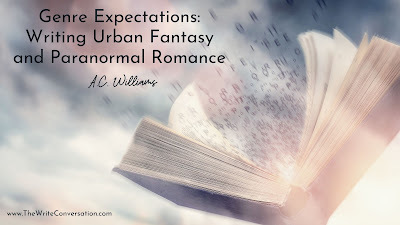
by A.C. Williams @ACW_Author
Vampires, Werewolves, Shifters—Oh my!
“Oh my!” is right. When you start digging deeper into the market’s expectations for some of the most popular low-fantasy genres, story elements can get pretty weird really fast. Not that weird is bad necessarily, but it does get confusing. Hopefully this series on genre expectations can help clarify what genre you’re writing, so that when you start marketing it, you can target the right audience for it.
So far in this series we’ve talked about many different genres and how they compare to each other (links at the end of the post):Romantic fantasy and fantasy romanceFantasy and space operaSteampunk and GaslampMagical realism and contemporary fantasy
Today we’re going to chat about two monstrously popular subgenres of fantasy: Urban Fantasy and Paranormal Romance (monstrously… did you see what I did there?).
At first glance, you might think that these two genres are exactly the same, and while it’s true that they share many similarities, at the core, they’re completely different. But beyond the core of the genres being different, they attract a completely different audience.
Urban Fantasy novels are about adventures and mysteries, thriller-type stories with elements verging on horror and suspense. Paranormal Romance novels are, well … romantic. They are romance stories, focused on whether or not the main couple will actually end up together or not. Sure, they may include vampires, werewolves, zombies, or any other type of non-human creature, but the point of the story is the romantic relationship between the characters.
So, again, like we saw with the Fantasy Romance and Romantic Fantasy, the primary difference between these popular genres is the driving point of the story itself.
Before we continue, I do feel the need to say that just because I’m using these books as examples of the genres doesn’t mean I am personally recommending them. I believe there is value in learning what the market is looking for when it comes to tropes and story elements, but with these two genres in particular, the content tends to walk the line of what many readers consider acceptable. As genre examples, they are useful, but utility as an example of how to write in a certain genre doesn’t automatically indicate morality. So respect your personal convictions and never shut your brain off. Pay attention to what you’re reading and decide for yourself if it will cross a boundary in your life.
With that being said, let’s consider some popular examples of both Urban Fantasy and Paranormal Romance.
The Dresden Files by Jim Butcher is probably one of the most recognizable Urban Fantasy book series currently on the market. Another one very similar to that series is The Iron Druid Series by Kevin Hearne. It’s very similar content, just with a very Irish vibe rather than underworld Chicago. Both series feature lots of action and adventure, and both include heavy use of magic and mythology to offset their contemporary settings.
Now, I believe both have elements of romance in their individual storylines, but those romantic subplots aren’t what actually drives the story. The adventure elements, the suspense elements, the defeating-the-big-bad-guy elements are what get the reader to turn the pages.
For Paranormal Romance examples, very honestly one of the best examples of the genre is The Twilight Series by Stephenie Meyer. Many other popular series include The All Souls Trilogy by Deborah Harkness (which also classifies as historical fantasy in many ways), and The Parasol Protectorate series by Gail Carriger (which also classifies as steampunk).
In these examples, even though there are other subplots happening that deal with some adventures and some mysteries, the primary driving point of the story is the relationship between the characters. Sure, you might care about the other story elements, but what brings readers back is the romance.
Will the character overcome their differences? Will they defeat the challenges that are keeping them apart? Will they find a solution to the obstacles that prevent them from being together? That’s how most regular romance novels work, but in a paranormal romance, the obstacles are—well—abnormal. Vampires. Werewolves. Monsters. Supernatural beings.
Regardless of how you may feel about the Twilight series, Stephenie Meyer started a phenomenon. Prior to the Twilight books, paranormal romance had truly been a fringe genre, and afterward? Well, there’s a reason it’s one of the most popular genres in the market now, for better or worse.
Can a vampire have a relationship with a human? That’s the forbidden romance trope to the extreme, and it’s the foundation for many of the paranormal romance bestsellers currently available.
So, if you are trying to determine if you’re writing Urban Fantasy or Paranormal Romance, the question boils down to the core of your plot.
Can you remove the romantic thread and maintain the point of your story? Well, then you’re probably writing Urban Fantasy. But if the romantic story is the heartbeat of the plot, it’s likely you’ve got a Paranormal Romance on your hands. Market them accordingly, because readers of one aren’t necessarily going to enjoy the other.
TWEETABLEGenre Expectations: Writing Urban Fantasy and Paranormal Romance @ACW_Author on @EdieMelson (Click to Tweet)
Don't Miss the Previous Posts in This Series 1. WRITING ROMANTIC FANTASY AND FANTASY ROMANCE 2. WRITING FANTASY AND SPACE OPERA 3. WRITING STEAMPUNK AND GASLAMP 4. WRITING MAGICAL REALISM AND CONTEMPORARY FANTASY 5. WRITING URBAN FANTASY AND PARANORMAL ROMANCE
 Award-winning author, A.C. Williams is a coffee-drinking, sushi-eating, story-telling nerd who loves cats, country living, and all things Japanese. She’d rather be barefoot, and if she isn’t, her socks won’t match. She has authored eight novels, two novellas, three devotional books, and more flash fiction than you can shake a stick at. A senior partner at the award-winning Uncommon Universes Press, she is passionate about stories and the authors who write them. Learn more about her book coaching and follow her adventures online at https://www.amycwilliams.com.
Award-winning author, A.C. Williams is a coffee-drinking, sushi-eating, story-telling nerd who loves cats, country living, and all things Japanese. She’d rather be barefoot, and if she isn’t, her socks won’t match. She has authored eight novels, two novellas, three devotional books, and more flash fiction than you can shake a stick at. A senior partner at the award-winning Uncommon Universes Press, she is passionate about stories and the authors who write them. Learn more about her book coaching and follow her adventures online at https://www.amycwilliams.com.
Published on June 06, 2024 22:00
June 5, 2024
Time Management for the Christian Author

by Lynn H. Blackburn @LynnHBlackburn
I’ve had the opportunity to teach a “time management for busy writers” class a few times over the past six weeks.
Now, if you happen to know me personally, you might find the idea of me teaching this class to be laughable. My sister asked me to let her know anytime I would be presenting this material so she could stay far, far away…in order to avoid lightning strikes!
And it’s true that if you’ve spent time around me while I’m on a deadline, you could conclude that time management isn’t my strongest characteristic. In fact, you might even say that I need to take a class on this subject rather than teaching it.
Of course, I argue that I’m the perfect person to teach it BECAUSE I haven’t mastered time management, and I don’t think I ever will.
Stay with me.
I work hard, spend hours in front of my computer, lose sleep, and say no to things I want to do. I cry, pray, whine, eat a lot of chocolate, remove social media apps from my phone, use pomodoros, and participate in writing sprints.
I take my own advice! I really do!
But it’s still a mystery to me. And if you were to take my time and my responsibilities and put them into a spreadsheet or a time journal, you’d come to the same conclusion I have.
There is no human explanation for the fact that in the past ten years, I’ve written ten books and four novellas.
So…how have I done it?
Well, again, I do work very hard. And I do utilize time management approaches that help. But as a Christian author, I believe there is more going on than my ability to manage my life in such a way that I’m able to do all God has called me to.
Which is why, no matter how many times I review my notes or teach this class, my favorite part is near the end when we talk about the poor widow from the Gospel of Mark.
And he sat down opposite the treasury and watched the people putting money into the offering box. Many rich people put in large sums. And a poor widow came and put in two small copper coins, which make a penny. And he called his disciples to him and said to them, “Truly, I say to you, this poor widow has put in more than all those who are contributing to the offering box. For they all contributed out of their abundance, but she out of her poverty has put in everything she had, all she had to live on.” (Mark 12:41-44, ESV)
I remember the first time I heard these verses and thought about them from the perspective of a busy writer. As someone for whom time is not an abundant resource, the time I give to my writing is, truly, a sacrifice. It’s a gift. It’s an act of obedience and worship.
And then I remembered the widow of Zarephath from I Kings 17 who only had enough oil and flour for one cake. Just one. But she gave it to the prophet Elijah, and miraculously, during a famine, she never ran out of oil or flour.
There was always enough. Not enough to waste. Not enough to feel comfortable. But enough.
And that’s what I want to encourage you with today. Your time may be in limited supply. But when you give it all to God, it will be enough.
Don’t expect God to give you more time.Instead, be amazed by what He can do with the little time you have.
Grace and peace,Lynn
TWEETABLETime Management for the Christian Author from @LynnHBlackburn on @EdieMelson (Click to Tweet)
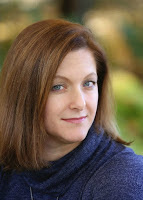 Lynn H. Blackburn is the award-winning author of Unknown Threat, Malicious Intent, and Under Fire, as well as the Dive Team Investigations series. She loves writing swoon-worthy southern suspense because her childhood fantasy was to become a spy, but her grown-up reality is that she's a huge chicken and would have been caught on her first mission. She prefers to live vicariously through her characters by putting them into terrifying situations while she's sitting at home in her pajamas! She lives in Simpsonville, South Carolina, with her true love, Brian, and their three children. Learn more at www.lynnhblackburn.com.
Lynn H. Blackburn is the award-winning author of Unknown Threat, Malicious Intent, and Under Fire, as well as the Dive Team Investigations series. She loves writing swoon-worthy southern suspense because her childhood fantasy was to become a spy, but her grown-up reality is that she's a huge chicken and would have been caught on her first mission. She prefers to live vicariously through her characters by putting them into terrifying situations while she's sitting at home in her pajamas! She lives in Simpsonville, South Carolina, with her true love, Brian, and their three children. Learn more at www.lynnhblackburn.com.
Published on June 05, 2024 22:00
June 4, 2024
Falling in Love with the Characters We Write, Read, & Watch
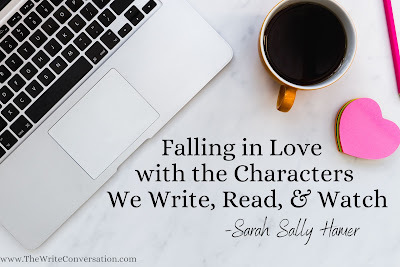
by Sarah Sally Hamer @SarahSallyHamer
How long does it take for you to fall in love with a character in a book? Why do you fall in love? What is it about that character that makes you want to wrap yourself up in their world and go for the ride?
Good characters do that to me. Charlotte in her web, Meg tesseract-ing across the universe, Dorothy following that yellow brick road—all of these and many, many more have enticed me into their magical Hero(ine)'s Journey, allowing me to see myself through their eyes. And, with great joy, I continue to search for other characters to pull me in.
What is it that makes us love them?
It's different for everybody. We all have traits we admire, and wish to emulate, that we find in the characters in multiple stories. I loved the strength and determination Dr. Richard Kimble exuded in The Fugitive. He KNEW he didn't kill his wife and was willing to risk everything to find the one-armed man who did. Jason Nesmith in Galaxy Quest, the Star Trek knockoff, was a selfish jerk at the beginning, very unlikable. But he finally found his "hero-ness" and came through when he was really needed. I've fallen back in love with Paul Atreides of Dune with the two latest movies, but I loved watching the boy turning into a man years ago. And, yes, I know what happens to him in later books. But I can still be okay with now.
None of these characters had to be perfect. In fact, some of my favorite ones have far to go to become loved since they are downright unpleasant at first. But it's the journey they take that makes them real. In their amazing workbook, The Positive Trait Thesaurus, Angela Ackerman and Becca Puglisi say, "Creating realistic, never-before-seen characters who take readers on an emotional journey should be the goal of every writer, yet this is not easy feat." They're right. It's not. But if we can find the true depth of a character, we can at least attempt to make them memorable.
So, how do we make our characters memorable? It takes effort. It takes digging deep. It takes finding the character within our self.
Did you ever notice that some of the characters you love the best are ones who have traits you'd like to have? I was a scared-all-the-time child, so watching characters go from scared to courageous helped me to learn more about myself. "Fixing" people was another trait—me thinking I was responsible for everyone else. But I learned that people have to fix themselves from the books I read: for instance, Dorothy had to discover that she was worthy of trusting herself to click those ruby heels together to get home. Sometimes those lessons are really hard, but the ability to learn from "experts," characters who made it work, really helped.
Not all characters are good role models. But, if you find them loveable at any level, you might find something to aspire to.
Here are some tips:Watch movies and/or read books. Find the characters that you really resonate with.Look for their traits, both positive and negative. Angie and Becca have written several excellent books on character traits and there are lots of other ones out there. Watch for the scenes that best express those traits. In a good story, characters SHOW us who they are. See if you can locate and describe the character arc. Some of them are really simple, with some a lot more complex.
Then, if you choose, see how that character can teach you something. It may be as easy as fear to courage or as hard as lack of self-worth to being worthy of achieving a goal. It can be Karl (the movie, Up) who goes from bitter and angry at life to where he'll walk away from his original goal to save Russell. Or Sully (in the movie, Monsters, Inc.) who gives up his innocence and desire to become the top scarer in his company to save the most frightening thing in his life, a little human girl. Or how Maximus (Gladiator) gives up his life to save his world. There are more than I could ever name. All of these characters are worth discovering.
And, as I watch these movies or read the books, I find that, ultimately, some lessons are worth learning.
What characters have you fallen in love with? Why?
TWEETABLEFalling in Love with the Characters We Write, Read, & Watch from @SarahSallyHamer on @EdieMelson (Click to Tweet)
 Sarah (Sally) Hamer, B.S., MLA, is a lover of books, a teacher of writers, and a believer in a good story. Most of all, she is eternally fascinated by people and how they 'tick'. She’s passionate about helping people tell their own stories and has won awards at both local and national levels, including two Golden Heart finals.
Sarah (Sally) Hamer, B.S., MLA, is a lover of books, a teacher of writers, and a believer in a good story. Most of all, she is eternally fascinated by people and how they 'tick'. She’s passionate about helping people tell their own stories and has won awards at both local and national levels, including two Golden Heart finals.A teacher of memoir, beginning and advanced creative fiction writing, and screenwriting at Louisiana State University in Shreveport for over twenty years, she also teaches online for Margie Lawson at WWW.MARGIELAWSON.COM. Sally is a free-lance editor and book coach, with many of her students and clients becoming successful, award-winning authors.
You can find her at INFO@MINDPOTENTIAL.ORG
From Sally: I wish to express gratitude to the giants upon whose shoulders I stand and who taught me so much about the writing craft. I would list every one, if it were only possible.
Published on June 04, 2024 22:00
June 3, 2024
Playing with Words: An Author Looks at Fun Oxymorons
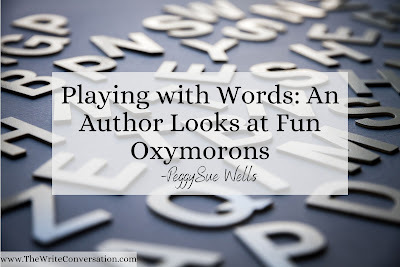
by PeggySue Wells @PeggySueWells
Bulldozed by illness, I went to see the doctor.
“You have acute bronchitis,” the doctor diagnosed.
“As opposed to an ugly one?” I asked.
“Acute means ugly,” the doctor explained.
“Then why not call it that?”
“You’re feverish.” The doctor penned a prescription on a medical pad.
“Actually,” piped up my 12-year-old, “she does that to words. Don't ask her about asphalt.”
“Asphalt?” The doctor looked at me expectantly.
“Street language for constipation,” I outlined.
The doctor handed me the paper. “Get this prescription filled immediately. It’s the strongest antibiotic I’ve got.”
For wordsmiths, word play is second nature and fun. Such as forming oxymorons.
A combination of contradictory or incongruous words, an oxymoron occurs when two words with opposite meanings are put together. By juxtaposing one another, the combination provides a thoughtful contrast and can reflect humor, irony, and sarcasm. Even the definition of the word oxymoron is appropriately an oxymoron. Oxy means sharp while moron means dull.
Here is a group of oxymorons. What would you add to the list?
adult children
authentic models
bittersweet
civil war
clearly misunderstood
cold fire
crash landing
current history
definite maybe
dull roar
extinct life
found missing
freezer burn
fried ice cream
friendly takeover
government intelligence
grow small
individual collections
jumbo shrimp
lead balloon
lost discoveries
minor miracles
negative income
neo-classic
new artifacts
old news
only choice
original copy
paper towel
peaceful conquest
permanent loans
plastic silverware
poor health
primitive advancements
private exhibit
recent past
recorded live
restored ruins
same difference
seriously funny
silent scream
soft rock
steel wool
sweet sorrow
unbiased opinion
virtual reality
working vacation
TWEETABLEPlaying with Words: An Author Looks at Fun Oxymorons from author @PeggySueWells on @EdieMelson (Click to Tweet)
 PeggySue Wells is the bestselling author of 40 books and collaborator of many more. Action and adventure, romantic suspense, military romance, and cozy mystery are the page-turning novels by P.S. Wells, including Homeless for the Holidays, Chasing Sunrise, The Patent, and Unnatural Cause. How to live better, easier, and simpler is the focus of her nonfiction including The Ten Best Decisions A Single Mom Can Make. Founder of SingleMomCircle.com, PeggySue coaches writing and speaks at events and conferences. When not writing, she parasails, skydives, snorkels, scuba dives, rides horses, and has taken (but not passed) pilot training. Connect with her at www.PeggySueWells.com, on Facebook at PeggySue Wells, and LinkedIn at linkedin.com/in/peggysuewells
PeggySue Wells is the bestselling author of 40 books and collaborator of many more. Action and adventure, romantic suspense, military romance, and cozy mystery are the page-turning novels by P.S. Wells, including Homeless for the Holidays, Chasing Sunrise, The Patent, and Unnatural Cause. How to live better, easier, and simpler is the focus of her nonfiction including The Ten Best Decisions A Single Mom Can Make. Founder of SingleMomCircle.com, PeggySue coaches writing and speaks at events and conferences. When not writing, she parasails, skydives, snorkels, scuba dives, rides horses, and has taken (but not passed) pilot training. Connect with her at www.PeggySueWells.com, on Facebook at PeggySue Wells, and LinkedIn at linkedin.com/in/peggysuewells
Published on June 03, 2024 22:00



